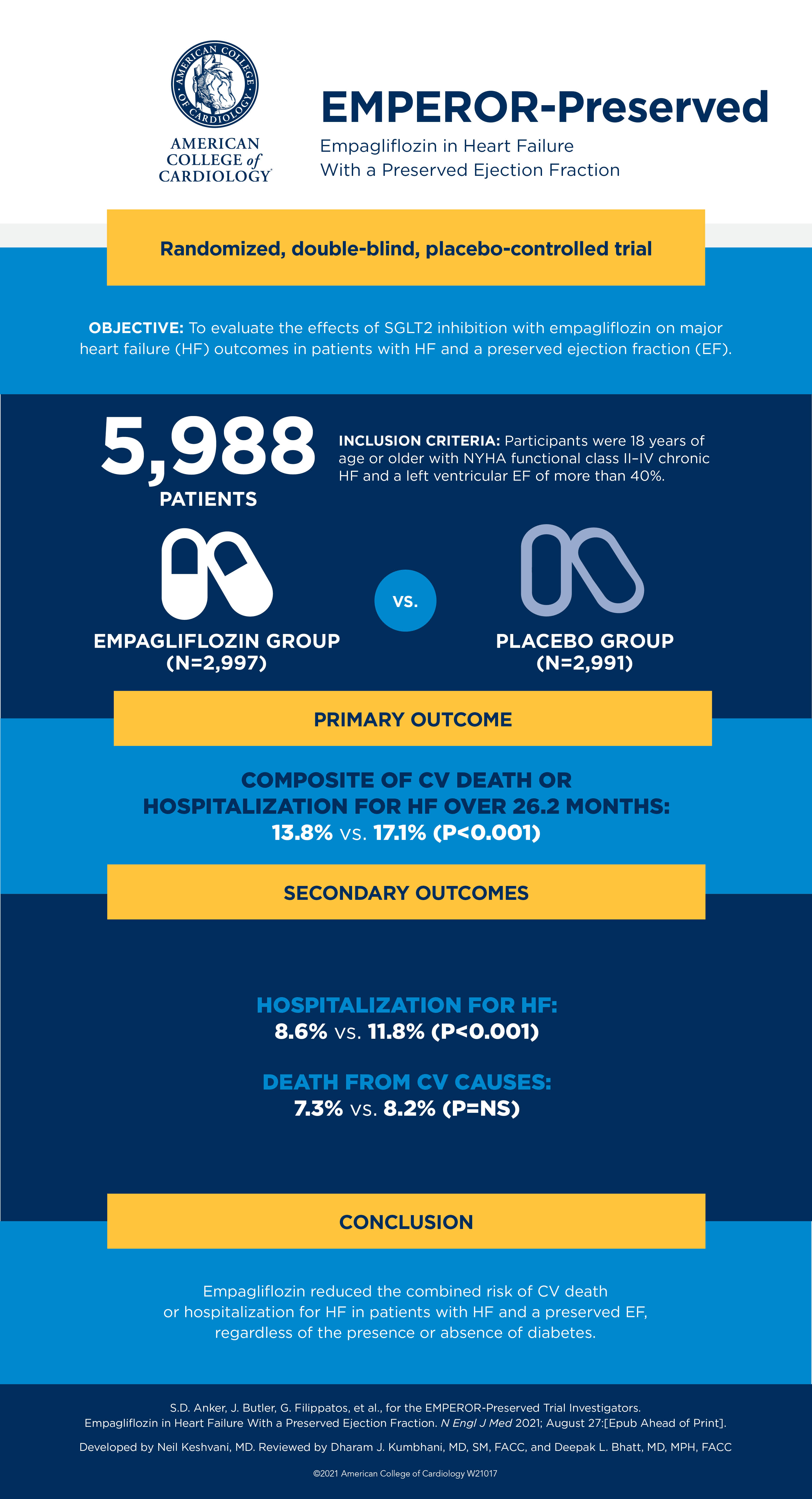EMPEROR Trials Look at Effects of Empagliflozin on Wide Range of HF Patients
Two separate trials – EMPEROR-Preserved and EMPEROR-Pooled – offer new data on the effects of empagliflozin on heart failure (HF) patients with reduced (HFrEF) or preserved ejection fraction (HFpEF). Both trials were presented Aug. 27 during ESC Congress 2021 and published simultaneously in the New England Journal of Medicine.
In EMPEROR-Preserved, researchers evaluated the effects of SGLT2 inhibition in nearly 6,000 HFpEF patients with and without type 2 diabetes from 622 centers in 23 countries. All patients had elevated N-terminal pro B-type natriuretic peptide (NT-proBNP) concentrations and evidence of structural changes in the heart or documented history of hospitalization for HF. The average ejection fraction was 54%. The median age was 72% and 45% were women.
Patients were randomized in a 1:1 ratio to receive either 10 mg of empagliflozin daily (n=2,997) or placebo (n=2,991). During the median follow-up period of 26 months, the primary outcome of cardiovascular death or hospitalization for HF occurred in 13.8% of patients in the empagliflozin group (n=415) compared with 17.1% in the placebo group (n=511). According to investigators, this difference was primarily due to a lower risk of HF hospitalization in the empagliflozin group. They added that the findings were consistent across all prespecified patient subgroups regardless of ejection fraction or diabetes status.
In terms of secondary outcomes, researchers reported the total number of hospitalizations for HF was lower in the empagliflozin group than the placebo group. Additionally, the rate of decline in glomerular filtration rate (eGFR) during study treatment was slower in the empagliflozin group compared with the placebo group (–1.25 vs. –2.62ml/min/1.73 m2/year; p<0.0001). Serious adverse events occurred in 47.9% of patients in the empagliflozin group (n=1,436) and 51.6% of patients in the placebo group (n=1,543). Other side effects, including uncomplicated genital and urinary tract infections and hypotension, were more common in patients treated with empagliflozin, researchers said.
"Empagliflozin convincingly reduced the combined risk of cardiovascular death or hospitalization for HF in patients with HF and a preserved ejection fraction, with and without diabetes," said Stefan Anker, MD, principal investigator. "This drug has the potential to become a new standard treatment for these patients, who currently have few therapeutic options." In a related NEJM editorial, Mark H. Drazner, MD, FACC, agreed calling the findings "a major win against a medical condition that had previously proved formidable." He writes: "Ultimately, the EMPEROR-Preserved trial should contribute to a change in clinical practice, given the paucity of therapeutic options available for patients with heart failure and a preserved ejection fraction."
In EMPEROR-Pooled, researchers led by Milton Packer, MD, FACC, conducted a pooled analysis of the EMPEROR-Reduced and EMPEROR-Preserved trials, both of which were carried out in parallel with nearly identical protocols, case report forms, investigative sites and administrative committees. According to researchers, the ejection fraction of patients – 40% or less in EMPEROR-Reduced and 40% or greater in EMPEROR-Preserved – was the only major difference between the two trials.
The pooled analysis of 9,718 patients found empagliflozin reduced the risk of HF hospitalization by roughly 30% in both trials, with the magnitude of this effect being similar across a broad range of ejection fractions below 65%. The analysis also found that empagliflozin reduced the risk of major renal outcomes in EMPEROR-Reduced, but not in EMPEROR-Preserved. However, trial investigators noted that in EMPEROR-Preserved, when renal outcomes were defined using more stringent criteria, pretreatment ejection fraction influenced the effect of empagliflozin on renal outcomes in a manner that paralleled the drug's effect on heart failure.
"Taken together, these findings demonstrate the benefits of empagliflozin across a broad range of patients with heart failure with a reduced and preserved ejection fraction, including many not effectively treated with currently available agents," Packer said.

Clinical Topics: Diabetes and Cardiometabolic Disease, Geriatric Cardiology, Heart Failure and Cardiomyopathies, Prevention, Acute Heart Failure
Keywords: ESC Congress, ESC21, Stroke Volume, Heart Failure, Diabetes Mellitus, Primary Prevention, Metabolic Syndrome, Geriatrics, ACC International
< Back to Listings
